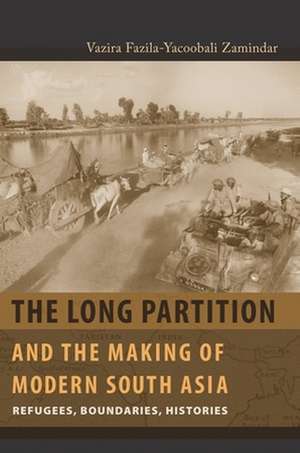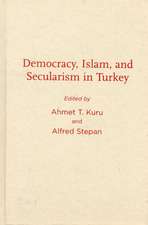The Long Partition and the Making of Modern South Asia – Refugees, Boundaries, Histories
Autor Vazira Fazila Zamindaren Limba Engleză Paperback – 19 apr 2010
In this remarkable study based on more than two years of ethnographic and archival research, Vazira Fazila-Yacoobali Zamindar argues that the combined interventions of the two postcolonial states were enormously important in shaping these massive displacements. She examines the long, contentious, and ambivalent process of drawing political boundaries and making distinct nation-states in the midst of this historic chaos.
Zamindar crosses political and conceptual boundaries to bring together oral histories with north Indian Muslim families divided between the two cities of Delhi and Karachi with extensive archival research in previously unexamined Urdu newspapers and government records of India and Pakistan. She juxtaposes the experiences of ordinary people against the bureaucratic interventions of both postcolonial states to manage and control refugees and administer refugee property. As a result, she reveals the surprising history of the making of the western Indo-Pak border, one of the most highly surveillanced in the world, which came to be instituted in response to this refugee crisis, in order to construct national difference where it was the most blurred.
In particular, Zamindar examines the "Muslim question" at the heart of Partition. From the margins and silences of national histories, she draws out the resistance, bewilderment, and marginalization of north Indian Muslims as they came to be pushed out and divided by both emergent nation-states. It is here that Zamindar asks us to stretch our understanding of "Partition violence" to include this long, and in some sense ongoing, bureaucratic violence of postcolonial nationhood, and to place Partition at the heart of a twentieth century of border-making and nation-state formation.
Preț: 269.17 lei
Nou
Puncte Express: 404
Preț estimativ în valută:
51.50€ • 53.78$ • 42.63£
51.50€ • 53.78$ • 42.63£
Carte tipărită la comandă
Livrare economică 04-18 aprilie
Preluare comenzi: 021 569.72.76
Specificații
ISBN-13: 9780231138475
ISBN-10: 0231138474
Pagini: 304
Dimensiuni: 163 x 229 x 16 mm
Greutate: 0.43 kg
Editura: Columbia University Press
ISBN-10: 0231138474
Pagini: 304
Dimensiuni: 163 x 229 x 16 mm
Greutate: 0.43 kg
Editura: Columbia University Press
Notă biografică
Vazira Fazila-Yacoobali Zamindar is assistant professor of history at Brown University.
Cuprins
List of Illustrations
AcknowledgmentsTranslations / TransliterationsIntroduction: The Place of PartitionThe Making of Refuges, 19471. Muslim Exodus from Delhi
2. Hindu Exodus from KarachiMoving People, Immovable Property3. Refugees, Boundaries, Citizens
4. Economies of DisplacementImagined Limits, Unimaginable Nations5. Passports and Boundaries
6. The Phantasm of PassportsIn Conclusion7. Moving BoundariesAbbreviations in Notes
Notes
Selected Glossary
Bibliography
Index
AcknowledgmentsTranslations / TransliterationsIntroduction: The Place of PartitionThe Making of Refuges, 19471. Muslim Exodus from Delhi
2. Hindu Exodus from KarachiMoving People, Immovable Property3. Refugees, Boundaries, Citizens
4. Economies of DisplacementImagined Limits, Unimaginable Nations5. Passports and Boundaries
6. The Phantasm of PassportsIn Conclusion7. Moving BoundariesAbbreviations in Notes
Notes
Selected Glossary
Bibliography
Index










